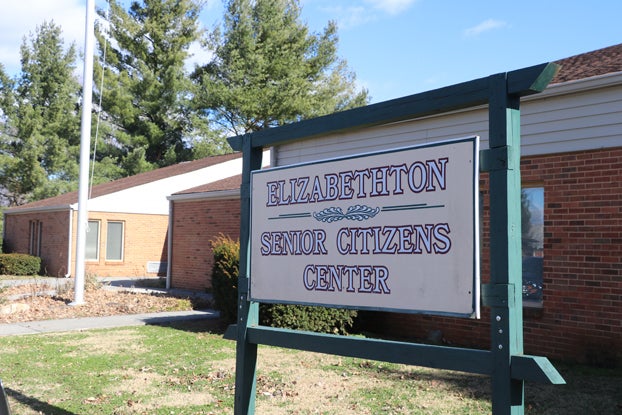Citizens support health systems merger; express goals, concerns
Published 8:51 am Thursday, March 24, 2016

Star Photo/Rebekah Price
Fielding Rolston, Chair of the Tennessee Board of Educaiton and former chair of the Wellmont Health System board, expresses his support of the Mountain States and Wellmont merger before the COPA Advisory Group and citizens at the first public hearing. He said it will reduce duplication of services and help to diversify specialized services while focusing resources and maintaining regional roots.
How should advantages and disadvantages of the merge of two health systems be measured? Citizens responded to this question regarding the proposed merger of Wellmont Health System and Mountain States Health Alliance (MSHA) at the first of five public hearings Tuesday night.
The hearing took place at the Carter County Health Department, at which 13 citizens — many from branches of the medical community — spoke. Opinions on the merger were almost entirely positive, with some concerns raised about the transparency of a “healthcare monopoly.”
The Tennessee Department of Health (TDH) must determine whether to issue a Certificate of Public Advantage (COPA) to Wellmont and MSHA. Though the COPA statute has existed since 1993, TDH Director Jeff Ockerman said none has ever been issued for a hospital merger.
According to Ockerman, a COPA may be issued when the parties involved present clear and convincing evidence of benefits, including but not limited to improvements to population health, access to services and economic advantages to the public. It also ensures that the inherent reduction in competition to provide health care and related services will not negatively impact the region or state. If the public advantage is not evident, Ockerman said the merged system would complete its Plan of Separation, which it filed as part of its lengthy application.
A COPA Advisory Group is a board of leaders in Northeast Tennessee who were appointed by state Commissioner of Health John Dreyzehner to hear the interests of internal stakeholders, external stakeholders and community members. The results of these hearings will help determine whether the merger will be of undisputable benefit to the communities involved.
The advisory group will use public to advise on the development of an index, or a grading scale, that would determine periodically whether the merger’s advantages outweigh any disadvantages.
Many that spoke shared common goals for the merger, which they believe will have both medical and economic benefits.
The elimination of duplicated services was mentioned often as a benefit of the merger, with speakers citing the negative economic impact of both systems competing to offer the same services and equipment. Additionally, they said it was important to keep the system operation local, rather than being bought out by a distant corporation, as some across the nation have been.
Lottie Ryans, board of education member in Johnson City, retired Vice President of Centurylink and Johnson City Chamber of Commerce board member, said the merger could make the area more appealing to potential medical students and physicians.
“We want to be the destination of choice for the brightest minds in the field of education,” said Ryans. “If you think about what a regional focus has meant to Nashville with Vanderbilt or for Duke in North Carolina, we have an opportunity to do the same in this region.”
She said she is equally excited about attracting and retaining a strong workforce. The merger could make salary alignments possible, reducing competition in employment and with equipment. She said this could mean to consolidating the equipment in the system to provide more services, so residents don’t have to leave the region for complex procedures or testing.
She and Bob Feagins, Executive Director of the Kingsport Chamber of Commerce, agreed that improved access to services would be a strong lure for businesses and developers.
“The future of healthcare in our area is essential not only for the lives of our residents, but for the economic growth of our region,” said Feagins. “We want to attract the top doctors and nurses and other healthcare personnel. We want businesses to be attracted to our communities and to invest in our economy, and the strength of our healthcare system will be part of their evaluation when deciding where to move and relocate.”
Larry Calhoun, founding dean of Bill Gatton College of Pharmacy as well as former Vice President of MSHA, said the merger will offer a unique opportunity to form a partnership between the new system and East Tennessee State University to provide better opportunities for experiential learning, more job prospects for graduates and improved access to research opportunities for physicians. He fully supported the merger for this and other reasons.
“The systems continuing to operate independently serves to only fragment our efforts to develop and enhance initiatives that can benefit the citizens of our region,” said Calhoun.
Though he said he was neither for or against the merger, Steve Hoplan, CEO of Medical Care, said he has concerns about a monopoly in healthcare. While it could reduce some corporate expenses, he said he fears that too much power in the hands of few without adequate checks and balances.
Cal Wilson, Senior Vice President of UBS Wealth Management Americas, Milligan College graduate and MSHA Foundation board member, said the COPA would provide the necessary oversight of the new system and would require a commitment to transparency.
Hopland’s other concerns regarded health information technology sharing, which he said has been a problem with Wellmont. He also said strategic insurance contracting could exclude independent physicians, and that patients have a right to seek service from their preference of physician, and it should not be a barrier to receiving services from the merged system.
Citizens also expressed interest in retaining and supporting rural hospitals. Candy Craig, a member on the board of the Sycamore Shoals Hospital Foundation, said she believes it will provide better rural care, and that education is an important component to focus on when improving rural population health.
Stan Johnson, Medical Exercise Specialist with GBC Wellness Center in Kingsport, member on the Population Health Board and Kingsport Chamber Board member, said preventative care in the workforce, schools and faith community could have a significant impact on rural health and economy. He said he would back the merger if it took a preventative approach to improving rates of obesity, smoking and cardiovascular disease, rather than simply treating people that are already sick. He said he would rather see these types of initiatives enacted with community partners than to see clinics be built to treat health issues which could have been prevented.
Overall, citizens spoke largely in favor of the merger and of the positive impact it could have on health, local economy and access to services.
The next meeting will take place on Tuesday at 5:30 p.m. at Northeast State Regional Performing Arts Center in Blountville. At it, the advisory board will hear from internal stakeholders including employees, contractors, vendors, staff clinicians and others who currently work with Mountain States Health Alliance or Wellmont Health System. Those that cannot attend the public hearings may submit their input online at tn.health@tn.gov.
To follow the results of the next four public hearings, or to learn more about the functions of a COPA, visit tn.gov/health/calendar/certificate-of-public-advantage. The final meeting, after five advisory board meetings, will be held for stakeholders and the public on June 7 at the Northeast State Regional Performing Arts Center at 5:30 p.m.
Members of the advisory group include Chair Gary Mayes, director of the Sullivan County Regional Health Department; State Representative David Hawk of Greene County; State Representative Matthew Hill of Washington County; Unicoi Mayor Johnny Lynch; Susan Reid, executive director of the First Tennessee Development District; George Brewer, administrator of Hancock Manor Nursing Home in Hancock County; Brent Kelch, executive director of Highland Physicians, Inc. in Sullivan County; Teresa Kidd, PhD, president and CEO of Frontier Health in Washington County; David Kirschke, MD, medical director of the TDH Northeast Tennessee Regional Health Department; Minnie Miller, former director of Johnson County Schools; Erika Phillips, coordinated school health director for Hawkins County; Chantelle Roberson, assistant general counsel for Blue Cross/Blue Shield of Tennessee; Perry Stuckey, senior vice president and chief human resources officer for Eastman Chemical Company; Jan Tillman, APN, RN, nurse practitioner with Roan Mountain Rural Health Consortia in Carter County; Thomas J. Wennogle, president of JardinZinc in Greene County; and Brenda White, EdD, former CEO of Girls Inc. of Kingsport.





